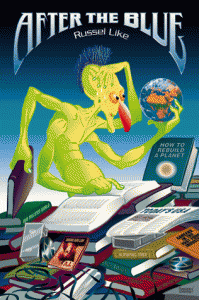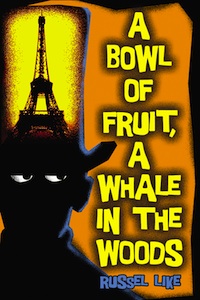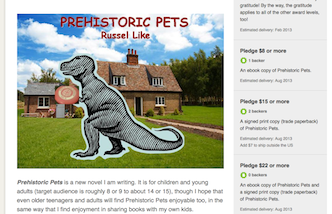How I Became a YA Author
EDITOR’S NOTE: We hope you enjoy Russel Like’s tale of becoming an accidental YA author. Russ is now working on book three — Prehistoric Pets — which is actually his first deliberate attempt to write a children’s book (he had to have kids first, he says). In keeping with the times, Russ is using Kickstarter to raise some support for the effort. If you like what you read below, you can pledge $8 (ebook) or $15 (signed print copy) or more and help bring what we’re sure will be a delightful new kids’ novel to life.
We don’t review Young Adult fiction books here at MiddleWeb (not yet, at least) but I was intrigued by the story of middle school dad, regional planner, and part-time fiction writer Russel Like when he contacted us recently and suggested an article about his writing adventures.
Like has produced two self-published science fiction novels in the past decade. Admittedly, there’s nothing so unusual about that. What intrigued us was that both books earned positive reviews in Booklist, the authoritative journal of the American Library Association. Over the years, they’ve also appeared on the reading lists of a number of far-flung schools in the US and Canada as good examples of satirical sf/fantasy.
Russ sent me a copy of After the Blue, which I found funny and cleverly written (for starters, imagine a race of well-meaning but not terribly bright aliens trying to recreate the McDonald’s fast food chain on Earth — after wiping out most of the human population). I can tell from the reviews (including Booklist) that his second book is even wilder and funnier. — John Norton, MiddleWeb co-editor.
Evolution of a children’s book writer
When I was a child, I never aspired to be a writer of children’s books. Even when I began writing with publication in mind, writing children’s books was not in my plans. My first two novels had science fiction themes and I wrote them with a general audience in mind.
Now I find myself setting out deliberately to write a children’s book – Prehistoric Pets — with support from a Kickstarter audience. How did I get from Point A to Point B? My experience may be of interest to other people like me who feel the urge to write stories, whatever their day job might be.
A book in search of an audience
I have always loved reading, and I have always enjoyed the process of raw imagination – of generating ideas that are humorous, bizarre, or merely innovative. It was sometime during college that I realized I also enjoyed the process of expanding upon my ideas, and I wrote for (and helped to edit) a college science fiction magazine. A few years after college, my store of ideas with no practical application had grown sufficiently large that I decided to write a novel, After The Blue, to house them.

I enjoyed writing the novel and finished it fairly quickly, in part because I had no family responsibilities at the time. When it was time to do something with the finished manuscript (i.e., have someone other than my mother look at it), I followed the path of many first time book authors and looked for someone who would take an interest in my manuscript.
Since I did not have an agent, it was not easy to attract larger publishers to my work. However, several smaller publishers expressed interest, and one of them, with whom I signed, even offered me a small (okay, a three-figure) advance. Unfortunately, the editor who was in charge of my book left the publishing house halfway through the process, and my book got shifted to the publisher’s back burner.
After some period of delay, during which I demonstrated a certain degree of impatience, the publisher finally told me that yes, they would eventually get to my book, but so as not to hold me up any longer, if I found another publisher interested in the manuscript, they would release me from my contract and would even hand over the work they had done so far (primarily editing and typesetting).
And then something interested happened . . .
Since the experience of waiting for someone else had been frustrating, I decided to publish the book myself. My decision to self-publish was made easier by the fact that several (albeit small) publishers had expressed interest in my work, and my decision was vindicated by the nature and quantity of the reviews I received, including a recommendation at the ALA Booklist.
And then something interesting happened: schools, from the middle level and up, began using After The Blue to teach satire. Some were close to where I live in New Jersey, but others were as far away as Vancouver, where in 2000 a school district actually replaced George Orwell’s Animal Farm on a school booklist as a more accessible example of satire for 21st century students.

A few years later, I wrote another sf-flavored satirical novel, A Bowl Of Fruit, A Whale In The Woods. Again, I did not write specifically for children, but it also earned recognition in the ALA Booklist in 2004. After that I didn’t write for a while. I always have ideas for more books, but I guess I more or less turned into a real adult and such responsibilities as marriage, work, babies, and the need to take care of a house encroached on the time I might otherwise have used to write down the stories going on in my head.
Becoming a writer for kids
Time passed, and the aforementioned babies got older and learned to read. My son, now 12 years old and in middle school, has read both of my books in the past few years. It is a curious feeling to review (and sign) the reading log your son will be submitting to his teacher and see a book that you yourself wrote before he was born listed there.
And it is a different kind of feeling when you have to order that same son to put down a book that you wrote because if he doesn’t stop reading and go to sleep he won’t be able to get up on time for school the next day. It’s gratifying, of course, that he enjoys your writing, but aggravating too because — the author of the book he is reading notwithstanding — he is once again not listening to you.
But I’ll confess the “gratifying” part trumps the “aggravating” part. Whereas in the past, I wrote for my own sense of humor, increasingly I find myself thinking of my children and their friends and what they might appreciate. And my children’s reading of other authors (yes, I do permit them to read work by authors other than myself) has had an impact on me as well. Without children in my house, I might never have been exposed to the books they enjoy – for example, popular kids’ series such as Captain Underpants, Diary Of A Wimpy Kid, or Frani K. Stein. I enjoy reading these books with my children but might never have picked them up if I hadn’t had age-appropriate residents in my household as an excuse.
And so these multiple threads — my visits to schools, my own children’s reading habits, and my son’s enjoyment of my work — have converged to inspire me to write specifically for children. I have begun writing a new work of fiction, Prehistoric Pets, aimed at children roughly from the ages of about 8 to 14. As the title suggests, Prehistoric Pets will tell the story of a pet store that sells live versions of extinct animals. As I write, I picture my own kids’ reaction to my words — maybe that’s one of the secrets of becoming an author of a true “children’s book.” Of course I hope that others will find something to like in them as well, and I even hope that parents might derive some furtive enjoyment from peeking at its pages, in the same way that I am amused by the books my kids leave lying around.
 Getting a kickstart
Getting a kickstart
As I write Prehistoric Pets I hope to grow some interest and support through the crowdfunding site Kickstarter. Since sites like Kickstarter did not exist when I wrote my previous books, I was unable to offer prospective readers the degree of collaboration and interaction I can now offer during the writing of Prehistoric Pets. Through Kickstarter, you can pre-buy copies of Prehistoric Pets prior to the book’s completion, and — if you are so inclined — even contribute ideas (or better yet, invite students to contribute ideas) which may find their way into the final book.
Go to my Kickstarter page for more information, including my short video about the project. With a little more than two weeks to go before the Kickstarter deadline, now would be a great time to do that!
Russel Like lives in New Jersey with his wife and children (ages 9 and 12). When not writing, he works for local government on economic and sustainability issues. He graduated from the University of Pennsylvania and earned a master’s degree at the University of North Carolina at Chapel Hill in city and regional planning.



































